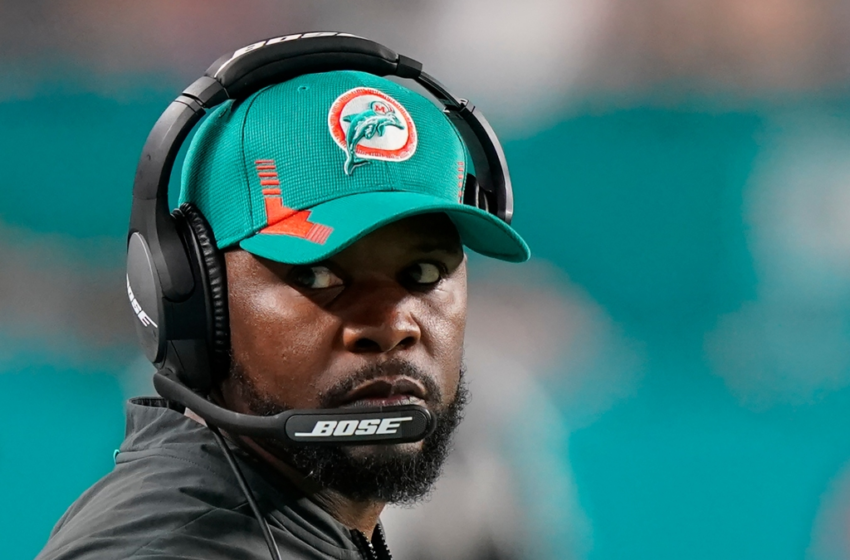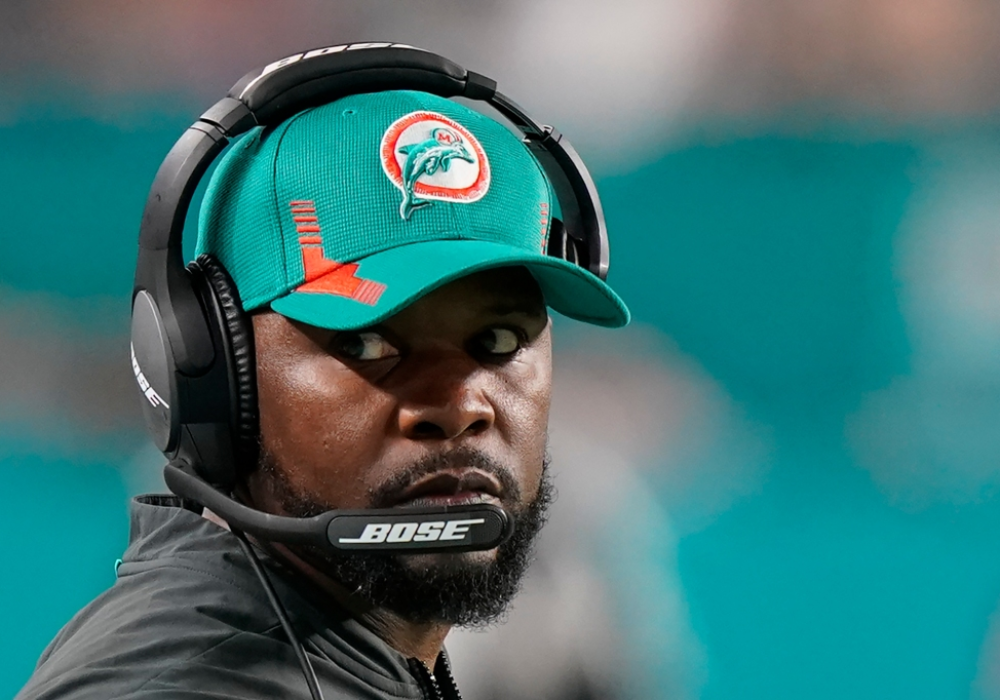UPDATED with NFL response. The NFL says the allegations of racial discrimination detailed by former Miami Dolphins head coach Brian Flores are “without merit.” In its full statement, the league said, “The NFL and our clubs are deeply committed to ensuring equitable employment practices and continue to make progress in providing equitable opportunities throughout our organizations. Diversity is core to everything we do, and there are few issues on which our clubs and our internal leadership team spend more time. We will defend against these claims, which are without merit.”
PREVIOUSLY:
Brian Flores, the former coach of the Miami Dolphins, has filed a racial discrimination lawsuit against the NFL and three of its teams, dropping a bombshell in the runup to the Super Bowl.
The complaint (read it HERE) is a proposed class-action case naming the league as well as the Dolphins, New York Giants and Denver Broncos as defendants. “John Doe teams 1-29” are also named, which could enable other class-action participants to target additional teams. After Flores was fired at the end of the season, despite a winning record with Miami, he was considered for numerous head coaching vacancies. He had a 24-25 record in three seasons with the Dolphins and his dismissal came as a surprise even to many football insiders, even though the team missed the playoffs for the past two years.
Flores alleges that his participation in those job interviews was a sham engineered as part of the NFL’s “Rooney Rule.” Named for the owner of the Pittsburgh Steelers, the rule came into effect nearly 20 years ago as an effort to ensure that more minority candidates get hired as NFL head coaches. Despite the rule, however, a league whose player rosters are 70% Black has just one Black head coach, Mike Tomlin of Pittsburgh. (Ron Rivera, an American of Puerto Rican descent, is head coach of the Washington Football Team.)
The complaint leads with a sensational piece of evidence: a text message sent by New England Patriots head coach Bill Belichick. (Flores once served as defensive coordinator of the Patriots and, as coaches do, continued to network with his former boss and other coaches.) Mistakenly thinking he was texting with newly named Giants head coach Brian Daboll, Belichick wrote that he thought the coach had a good chance to get the job. When Flores asked him to clarify, Belichick wrote back, “Sorry – I f–ked this up. I double checked and misread the text. I think they are naming Brian Daboll. I’m sorry about that. BB.”
The exchange (depicted via smartphone screenshots) meant that Flores learned of Daboll, who is white, getting the Giants job three days before Flores interviewed for the position. The suit alleges that Flores had to sit through a dinner with newly hired Giants GM Joe Schoen, under the pretense that he was still a candidate, even though Daboll had been internally locked in as the new coach.
As for the Broncos, Flores charges that John Elway, head of football operations for the team, was an hour late for their scheduled interview and appeared to be hung over. Vic Fangio, who is white, was hired a short time later. While at the Dolphins, the complaint says, Flores was offered $100,000 for each loss he would agree to take, in order to “tank” and thereby improve the Dolphins’ draft position. It also alleges that he was encouraged to try to sign a quarterback
Invoking Dr. Martin Luther King, Jr., the suit notes that it was filed in a federal court in Manhattan on the first day of Black History Month.
“While racial barriers have been eroded in many areas, Defendant the National Football League … lives in a time of the past,” the suit says. “The NFL remains rife with racism, particularly when it comes to the hiring and retention of Black Head Coaches, Coordinators and General Managers. Over the years, the NFL and its 32-member organizations (the ‘Teams’) have been given every chance to do the right thing. Rules have been implemented, promises made—but nothing has changed. In fact, the racial discrimination has only been made worse by the NFL’s disingenuous commitment to social equity.”
Among the demands of the suit are more sway for Black team officials and coaches when it comes to hiring decisions; assistance with getting more Black investors to buy stakes in NFL teams; more transparency in the hiring process; and for more Black coordinators to be hired.
In a response to the suit, the Giants issued a statement, according to multiple media outlets. “We are pleased and confident with the process that resulted in the hiring of Brian Daboll,” the team said. “We interviewed an impressive and diverse group of candidates. The fact of the matter is, Brian Flores was in the conversation to be our head coach until the eleventh hour. Ultimately, we hired the individual we felt was most qualified to be our next head coach.”
In a release put out along with the complaint, Flores, 40, acknowledged he was taking a significant personal and professional risk in filing the suit.
“God has gifted me with a special talent to coach the game of football, but the need for change is bigger than my personal goals,” he said. “In making the decision to file the class action complaint today, I understand that I may be risking coaching the game that I love and that has done so much for my family and me. My sincere hope is that by standing up against systemic racism in the NFL, others will join me to ensure that positive change is made for generations to come.”
The abrupt exit of Flores and the meager diversity stats among the top ranks of coaches have already been a topic of conversation. The Flores suit should turbocharge that conversation as the league, teams, media and others descend on LA ahead of Super Bowl LVI, which is slated for February 13.











